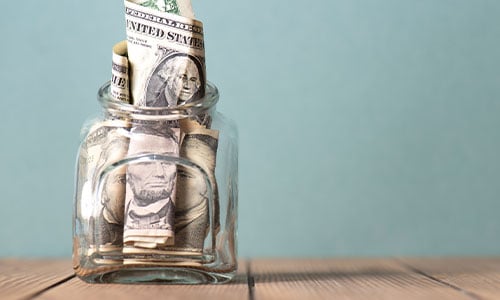
Should you open a savings account, or is the money okay in just your checking account? Consider these points when deciding if you need a savings account.
Whether it’s a rainy day, to save for a large purchase, or to avoid accidental spending, a savings account is an easy way to put money away. Savings accounts can help you build up funds to cover both planned and unexpected expenses. If you don’t have a savings account, you’re not alone! “Thirty-five percent of all adults in the U.S. have only several hundred dollars in their savings account and 34 percent have zero savings.” [1] It’s never too late to start saving. Check out these ways a savings account can help you.
What is a savings account?
A savings account is a bank account that lets you store your money securely while typically earning interest. This means the bank pays you to keep your funds deposited, with annual yields on some accounts. [2]
Why do I need a savings account?
There is always a chance an unexpected expense may arise, no matter how well you budget your money. A job loss or a sudden medical emergency could leave you wondering how you're going to pay the bills next month. The best way to protect yourself from these situations is to have an emergency fund stocked away. Everyone should have a savings account, especially during uncertain times. There is no risk to putting your money in a savings account, and the interest you earn by keeping money in a savings account will add up over time. Once you earn interest on the money you’re saving, that interest can earn interest, also called compounding interest.
Reasons you should start a savings account:
-
Earn a higher interest rate on your money
Instead of leaving your disposable income in a checking account, you can earn interest on your money if you put it in a savings account.
-
Savings accounts are inexpensive
You don’t have to have a ton of cash to start a savings account. Some banks require a deposit, while others may not require a deposit.
-
Helps curb spending
Money in a savings account is not as easy to withdraw as money in a checking account. This can help you to curb spending - since a majority of your money will stay in your savings and accrue interest, and you can’t withdraw funds as often.
-
Boost your emergency fund
An emergency fund is one of the most important uses of a high-yield savings account. Most experts suggest saving at least three months’ worth of expenses in an emergency fund. It is smart to have even more than three months saved for those who are self-employed.
-
Steadily save for a major goal
Use a high-yield savings account to save for big purchases like a car, home, or wedding. Saving a portion of each paycheck can help build up enough funds for these important life events.
-
Save more and safe often
If you’re able to save more, do it. Most people regret not saving earlier in life. You definitely won’t regret saving early and saving as much as possible.
Interested in opening a savings account? Visit your local Central Bank branch or contact us to get started!
Sources:
[1]. Here's How Many Americans Have Nothing at all Saved for Retirement, CNBC
[2]. What Is a Savings Account, NerdWallet